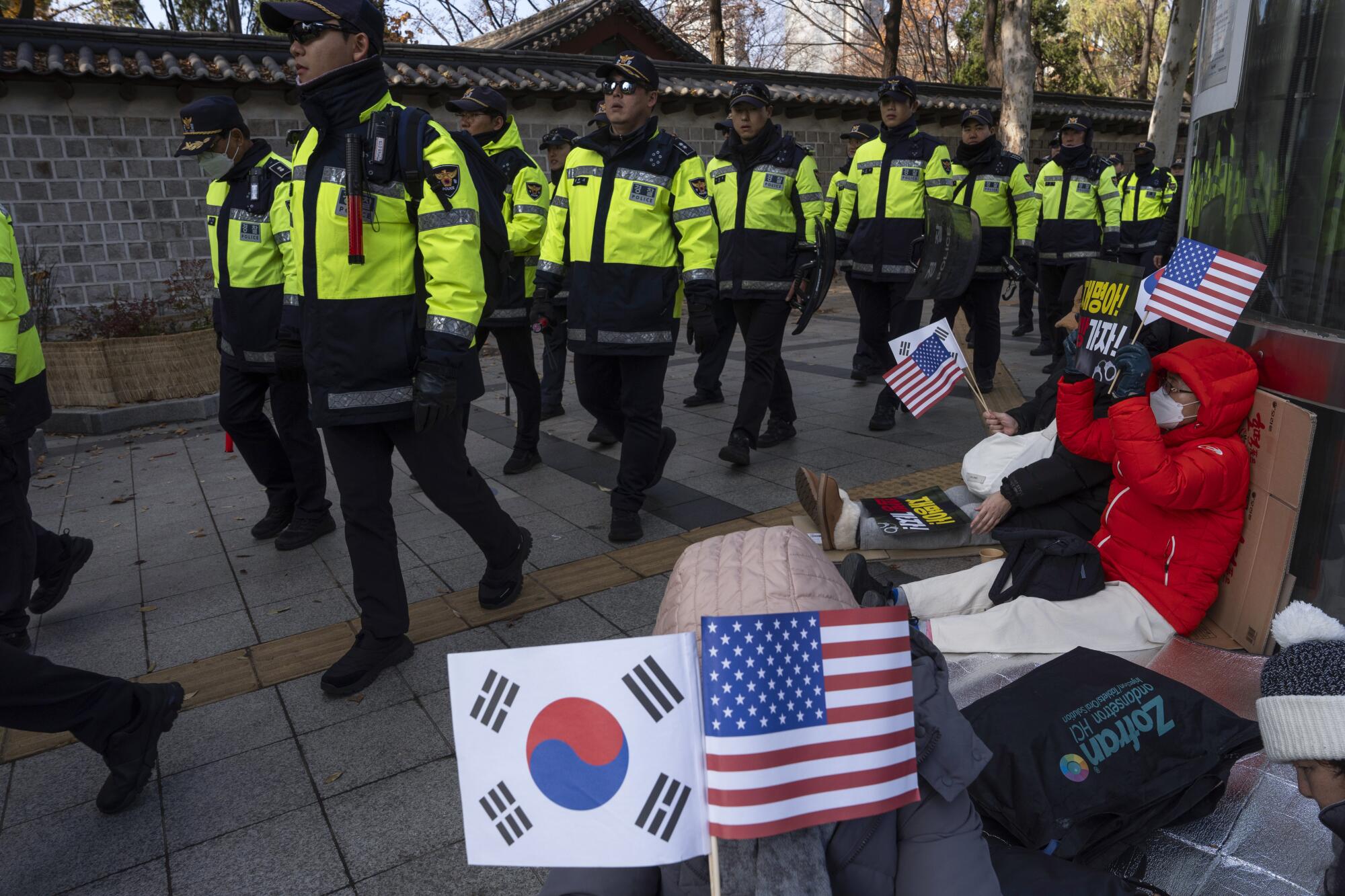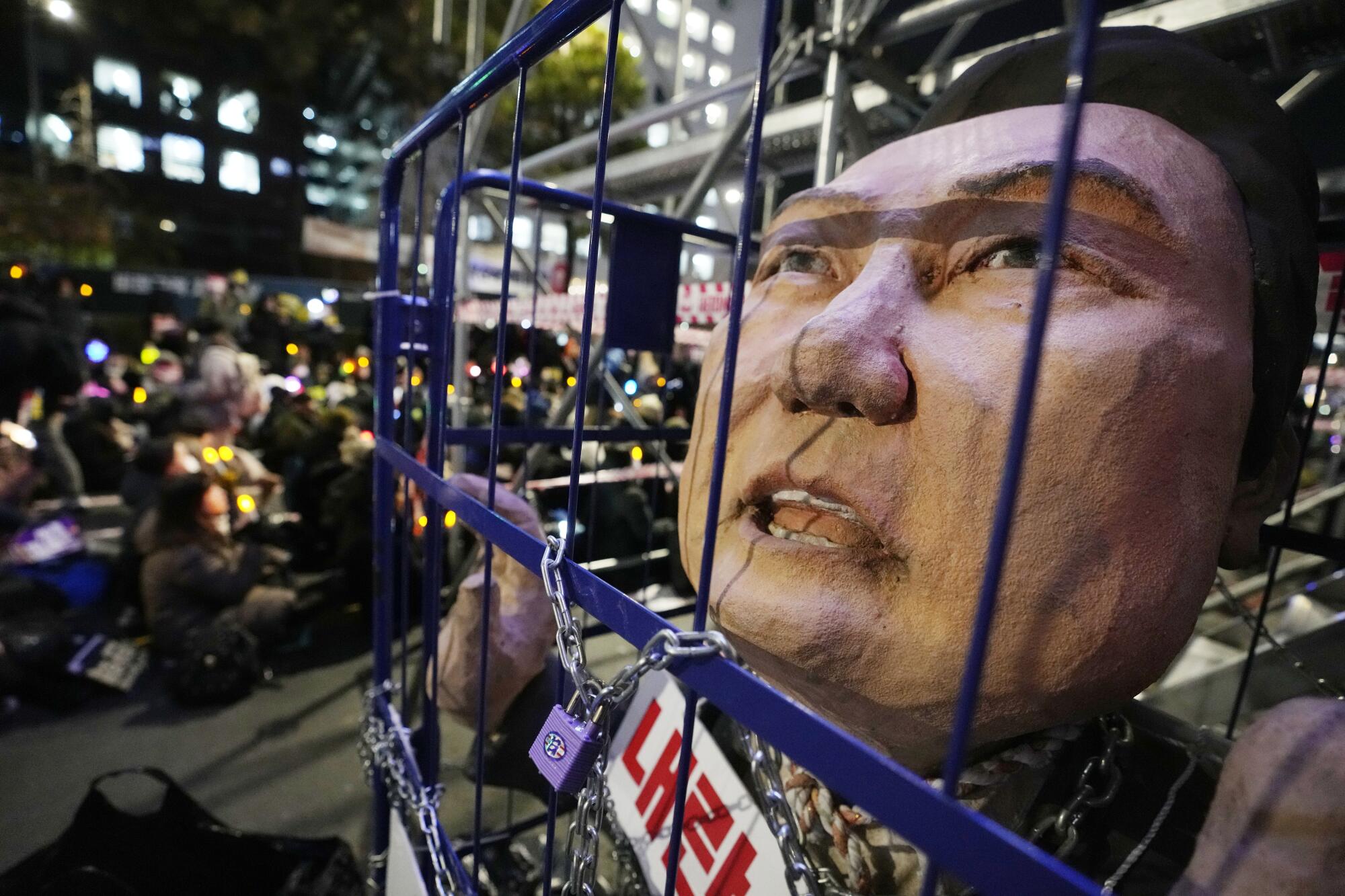SEOUL – South Korean lawmakers voted to impeach him on Saturday president Yoon Suk Yeolwhose short-lived declaration of martial law this month upended the democratic order and sparked a rapid campaign for his ouster.
Yoon's powers as president have been officially suspended and Prime Minister Han Duck-soo now serves as interim president. The country's Constitutional Court has 180 days to decide whether to uphold the law Impeachment motion. If so, Yoon will be officially removed, triggering a snap election within 60 days to choose a new president.
Outside the National Assembly, there was loud cheering from a large crowd of demonstrators calling for impeachment. Some of them had set up free coffee and snack stands for their fellow demonstrators. Elsewhere in the city, people sat in front of their smartphones and televisions, eagerly watching the surreal political moment.
But the uncertainty is far from over. In a televised address to the nation shortly after the impeachment vote, Yoon expressed defiance, saying he had worked for the good of the country “without a moment of rest.”
“I am frustrated to think that all of these efforts so far will have been in vain,” he said. “I will never give up.”
However, Yoon has lost the unified support of his own party. A dozen members of his conservative People Power Party joined opposition lawmakers in an effort to overcome the 200-vote threshold needed for his impeachment – two-thirds of the way through the legislative session. The final vote was 204 to 85.

President Yoon Suk Yeol, foreground, with his wife Kim Keon-hee at an official event in Daegu, South Korea, in June. The Constitutional Court now has 180 days to decide on his removal from office.
(Ahn Young-joon/Associated Press)
“This is a triumph for democracy and the South Korean people,” opposition party leader Park Chan-dae said after the vote.
Kim Ji-hoon, a 32-year-old actor from Seoul who recently worked as an extra in “12.12: The Day” – a historical drama that tells the story of one of South Korea's most infamous military coups in the late 1970s – had been watching the vote at home and remembered the anxiety he felt after Yoon declared martial law.
“It struck me how easily our hard-won peace could be taken away from us,” he said.
“We should never forget this moment, which should never be repeated again.”
Until now, many of Yoon's party members had done so defended himself They supported the opposition-led push to impeach him, saying they would instead seek an “orderly resignation.”
But recent developments have made this position untenable.
Numerous testimonies contradicted Yoon's claim that his Declaration of martial law on December 3 was intended only as a show of force against the opposition-controlled National Assembly – which he said was full of “subversive” saboteurs and North Korea sympathizers.
A document leaked to opposition lawmaker Choo Mi-ae by the military's counterintelligence unit showed that preparations for the statement had been made at least a month in advance – and that the military had checked available medical facilities, apparently in Expectation of bloodshed.

Police officers walk past Yoon supporters in Seoul on Thursday.
(Ng Han Guan/Associated Press)
A senior official in the unit also told lawmakers that a list of key politicians had been presented to him for arrest.
Lt. Gen. Kwak Jong-keun, the commander of the special force that stormed the National Assembly, testified this week that Yoon personally ordered him to prevent the gathering of 150 lawmakers – the hurdle needed to lift a declaration of martial law.
“Hurry up, break down the door and drag everyone in,” Kwak recalled Yoon telling him over the phone.
Even during martial law, preventing the National Assembly from carrying out its duties is a violation of the Constitution, which gives lawmakers the power to overturn a martial law order by majority vote, as they did in the early hours of December 4.
The question of intent will have a significant impact on one Riot investigation currently in progress. A deliberate attempt to undermine the Constitution, insurrection is one of the few crimes not covered by presidential immunity. If convicted, Yoon could face the death penalty or life in prison.
In a televised one public address On Thursday, Yoon vowed to “fight until the end.” He suggested that the opposition party's massive victories in April's general election were the result of voter fraud – a claim that has been debunked – and said declaring martial law was a legitimate exercise of his presidential powers.

Protesters on a train held a banner with a caricature of Yoon's face during a rally in the capital on Friday calling for his impeachment.
(Ahn Young-joon/Associated Press)
Han Dong-hoon, the chairman of Yoon's party, told the party's lawmakers: “He is trying to rationalize the current situation rather than regret it and is practically committing to the uprising.”
“We must support impeachment as official party policy.”
If the impeachment is confirmed by the Constitutional Court, Yoon would be the fourth South Korean president – out of eight – to be jailed or ousted since the country's democratization in 1987 after decades of authoritarian rule.
Roh Tae-woo, South Korea's first democratic president, was sentenced to 17 years in prison for his role in the 1979 coup that brought military dictator Chun Doo-hwan to power and led to a massacre of civilians.
The only other president to be successfully impeached was Park Geun-hye, a conservative who left office in 2017 sentenced to 22 years in prison for a corruption scandal involving large corporations and the daughter of a cult leader.
Both were leaders pardoned by their successors.
For now, Yoon will continue to receive his official salary of around $15,000 per month, live in the presidential residence and be protected by personal security, among other formal privileges.
But his short and turbulent political career is about to come to an abrupt end. A former prosecutor with no electoral experience, he was catapulted to the presidency two years ago because of his prominent role in investigating and jailing two other corrupt conservative presidents – Park and her predecessor. Lee Myung-baka former construction manager, was found guilty of accepting about $10 million in bribes while president.

An anti-Yoon prop will be on display at Friday's rally.
(Ahn Young-joon/Associated Press)
But Yoon's tenure was marked by criticism of authoritarian governance, such as: take tough action in the news media, in addition to bribery and financial crimes allegations against his wife.
Nevertheless, he presented himself as a bulwark of democracy on the international stage and hosted President Biden's Democracy Summit in March.
In his speech at the event, Yoon warned of the dangers faced by democratic systems.

